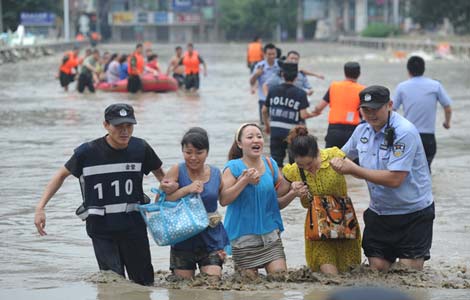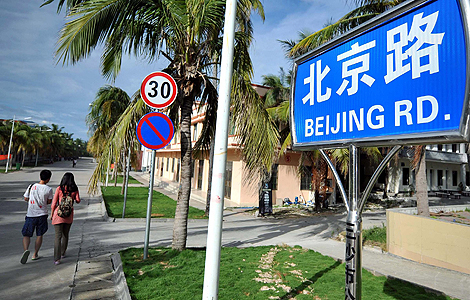Japan's blare has a purpose
Updated: 2013-07-10 08:10
(China Daily)
|
||||||||
Preparations for attempted "invasions" by other countries are on Japan's radar even though its 2013 defense white paper admits that the possibility is remote.
The white paper, released on Tuesday, claims that the security environment in the vicinity of Japan had grown severe last year, and it names China and other neighbors as threats.
But this is just another attempt by today's Japan to whitewash its own actions.
China, Russia and the Republic of Korea all have territorial disputes with Japan, which the white paper tries to deny.
In fact, the white paper reeks of Japan's distrust of its neighbors, which it is using as a convenient justification for its own military ambitions and a stronger bargaining chip in the defense alliance with the United States.
The Shinzo Abe administration has boosted Japan's defense budget for the current fiscal year, the first increase in the defense budget for 11 years, and Abe's ruling Liberal Democratic Party submitted recommendations to the Japanese government last month for a military buildup, which included acquiring more capability to attack enemy targets.
The recommendations also proposed that in order to boost "the defense" of "its outlying islands" - the disputed territories - Japan should establish a marine corps equipped with tilt-rotor aircraft such as the V-22 Osprey, and this corps is likely to be a core part of its new national defense guidelines due in December.
Although Japan's constitution, adopted in 1946, explicitly bans the creation of armed forces, Japan has built up land, air and sea forces, and passed laws to extend their reach beyond Japan to other countries.
However, Abe does not want to stop there. He is gearing up for a crushing victory in Japan's upper house election on July 21, which will put him in a good position to fulfill his dreams of changing the US-imposed "colonial constitution" and restoring the country's "greatness".
Japan is in the throes of a dangerous change, which is making its neighbors and the rest of the world uneasy.
It has already broken the consensus reached by its early leaders that there is a dispute with China over the Diaoyu Islands in the East China Sea. And its "nationalization" of some of the islets in September was its first step toward changing the status quo.
People should keep a close eye on what steps Abe takes next.
(China Daily 07/10/2013 page8)

 Breathe deep, this is the real thing
Breathe deep, this is the real thing
 Families of crash victims in SF
Families of crash victims in SF
 Rainstorms cause severe flooding and landslides
Rainstorms cause severe flooding and landslides
 Coal burning in China's north can shorten lives
Coal burning in China's north can shorten lives
 Some solar companies see brighter first half
Some solar companies see brighter first half
 Thousands flock to Texas Capitol over abortion
Thousands flock to Texas Capitol over abortion
 China's youngest city glistens under palm trees
China's youngest city glistens under palm trees
 Xinjiang tourism recovering
Xinjiang tourism recovering
Most Viewed
Editor's Picks

|

|

|

|

|

|
Today's Top News
China, US hold cyberissues talks
Shenzhen Red Cross denies organ claim
Security in cyberspace 'still major problem'
Headwinds may buffet growth
Rainstorms cause severe flooding and landslides
Li reassures sugarcane farmers
Japan tags China as 'security threat'
Honesty is a challenge for CPC
US Weekly

|

|








